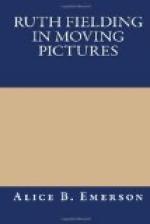“Don’t let your head be turned by success, little girl. And I don’t think it will be. You have succeeded in inventing two very original scenarios. We will hope you can do better work in time. But don’t force yourself. Above all have nothing to do with agents of film people who may want you to write something that they may rush into the market for the benefit of the advertising your school play will give you.”
“No, Mr. Farrington,” said Ruth, kindly. “I do not want to join your forces. I am not even sure that I shall ever be able to write another scenario. Circumstances seemed really to force me to write ’The Heart of a Schoolgirl.’ I am glad you think well of it. Good afternoon.”
“Can you beat her?” demanded Jennie, a minute later, when the long-legged Mr. Farrington had strutted angrily away. “Ruthie is as calm as a summer lake. She can turn an offer of fame and fortune down with the greatest ease. Let’s see that check, you miserable infant,” she went on, grabbing the slip of paper out of Mary’s hand. “Oh, girls, it’s really so!”
Ruth was reading another paragraph in Mr. Hammond’s letter. He said:
“The check enclosed is for you, yourself. It has nothing to do with the profits of the films we now release. It is a bribe. I want to see whatever scenarios you may write during the next two years. I want to see them first. That is all. We do not need a contract, but if you keep the check I shall know that I am to have first choice of anything you may write in this line.”
The check went into Ruth’s bank account.
That very week “The Heart of a Schoolgirl” was to be shown at the local Opera House. Mrs. Tellingham gave a half holiday and engaged enough stages besides Noah’s old Ark, to take all the girls to the play. They went to the matinee, and the center of enthusiasm was in the seats in the body of the house reserved for the Briarwood girls.
The house was well filled at this first showing of the picture in Lumberton, and more than the girls themselves were enthusiastic over it. To Ruth’s surprise the manager of the house showed “Curiosity” first, and when she saw her name emblazoned under the title of the one-reel film, Ruth Fielding had a distinct shock.
It was a joyful feeling that shook her, however. As never before she realized that she had really accomplished something in the world. She had earned money with her brains! And she had written something really worth while, too.
When the five-reel drama came on, she was as much absorbed in the story as though she had not written it and acted in it. It gave her a strange feeling indeed when she saw herself come on to the screen, and knew just what she was saying in the picture by the movement of her lips—whether she remembered the words spoken when the film was made or not.
Everything went off smoothly. The girls cheered the picture to the echo, and at the end went marching out, shouting:




